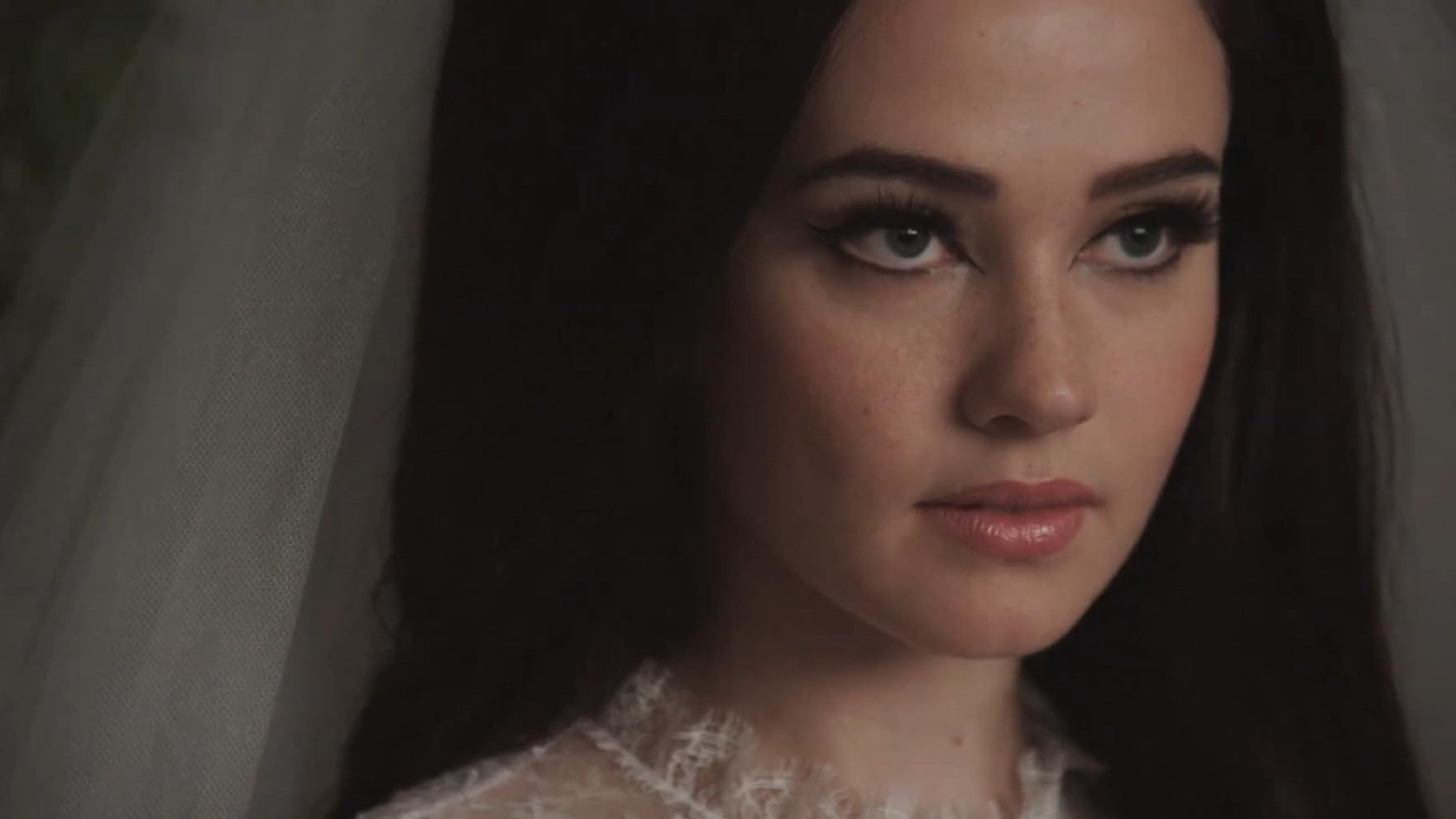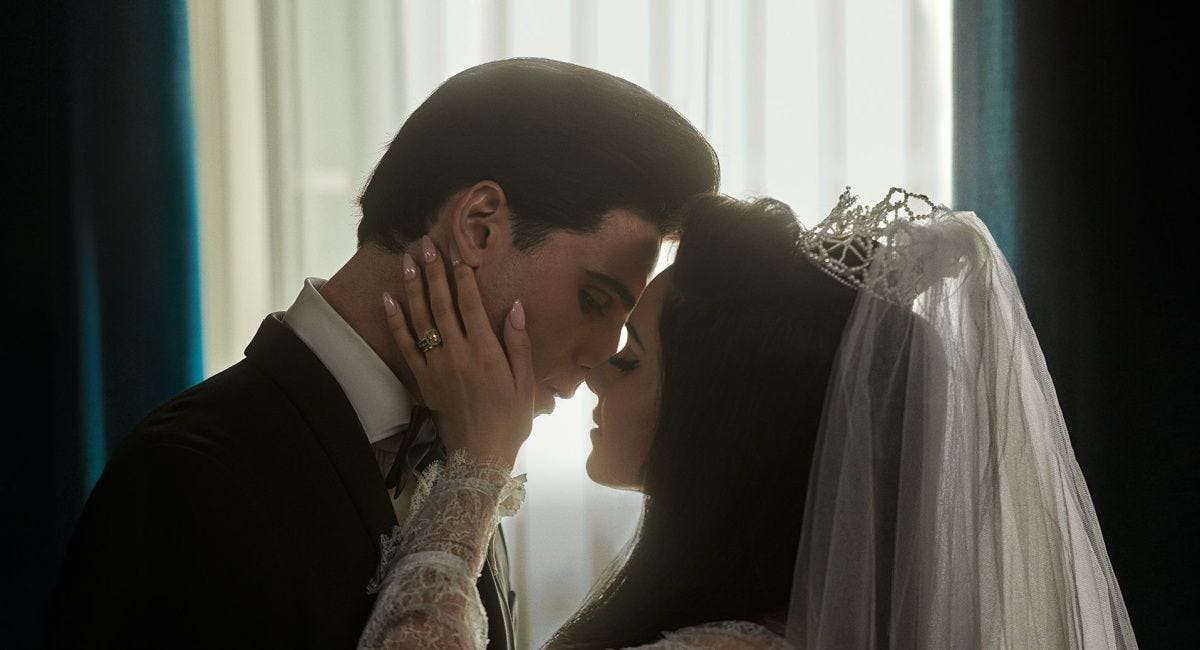#23
On 'Priscilla'
There she stands, five-foot-nothing, in little kitten heels with her black bouffant to the Gods.
I must protect her.
Cailee Spaeny in Priscilla (2023) dir. Sofia Coppola.
A baby-pink, cotton clad girl sits stirring a milkshake by the bar of a mock-American diner in Wiesbaden, West Germany. It’s nineteen fifty-nine. Shifting her frame atop the black leather swivel stool, a transistor radio doo-wops from the back room. Military aircrafts cut through the skies, as a US Army officer strides slowly towards her, combat boots rubbing against the checkerboard linoleum.
Bringing his cap to his chest, he asks, “Do you like Elvis Presley?”
A gentle pause.
“Of course, who doesn’t?”
Sofia Coppola’s Priscilla (2023) presents an honest portrait - bound by blue satin and lacquer - of Priscilla Beaulieu, an American schoolgirl stationed overseas with her parents during the Cold War. Prematurely plucked from girlhood, Beaulieu falls into the whisky-soaked cabal of Rock and Roll’s once brightest star, Elvis Aaron Presley.
Coppola, lauded for her melancholic vignettes of adolescence, perfumed with the pastel, plastic fixtures of white girlhood - The Virgin Suicides (1999), Lost in Translation (2003) and Marie Antoinette (2006) to name a few - marks a directorial pivot through depicting the early life of actress and entrepreneur Priscilla Presley.
Delicately thimble-and-threaded from Presley’s best-selling 1985 memoir Elvis and Me: The True Story of Love Between Priscilla Presley and the King of Rock ’n’ Roll, the depiction of Presley’s earlier years - of which was overseen by Presley as Executive Producer - unfolds in a distinctly restrained fashion, sitting softly in stark contrast to Baz Luhrmann’s gunmetal glitter bomb Elvis (2022).
Priscilla opens plush and pastel - Elnett emanating from the screen - as Beaulieu teases her beehive, making herself up as Muse. As the film delicately unfolds, succumbing to the clutches of Elvis and his handlers, Priscilla shreds any semblance of identity and transforms into the other.
Blue eyes obscured by black liner and lashes, she cannot cry.
Priscilla (2023) dir. Sofia Coppola.
Within Priscilla, Coppola gently lifts the veil of celebrity deification and allows us to look beyond the satin-lined velvet curtain. All that glitters certainly isn’t gold, as Coppola, aided by cinematographer Philippe Le Sourd, permeates Priscilla with a subtle dullness - all colour drained from her world. In spite of the orange Memphis sun beaming down upon Graceland, all baby pinks and duck-egg-blues are softly flattened and subdued.
There is no gloss, glimmer or acrylic shimmer within Priscilla, but only the stark reality of a young girl bound by the trappings of the post-war patriarchal family structure. The narrative of Elvis and Priscilla’s romance has, historically, been adored by Elvis aficionados and classic Hollywood lovers alike, and only within recent years has their power dynamic re-entered the public consciousness and experienced deserved disapproval.
The problematic nature of this dynamic is articulated with meticulous poise, through the casting of breakout star Cailee Spaeny as Priscilla, alongside Euphoria’s Jacob Elordi as Elvis.
Spaeny’s portrayal of Priscilla Presley is that of a wide-eyed girl, meek and mild, finding her way through the world amidst her isolation in Europe, away from her friends and all that is familiar. Bright and bare-faced, Spaeny maintains the presence throughout of a vulnerable, teenage girl in search of affection.
Elordi, unceremoniously introduced within the latter half of the first act - legs spread upon the couch in a dimly lit lounge, clouds of cigar smoke wading through the stale air - remains a looming, possessive presence on screen, aided by his towering six-foot-five frame. Contrary to Austin Butler’s fiery invocation of Presley in Elvis, Elordi’s interpretation feels distinctly stripped back - devoid of ritualistic practice. Presenting a diluted nod to Presley’s aura, Elordi utters a slight Southern drawl with a relaxed and downturned jaw.
Within those first scenes, dear reader, I found myself in some ways strangely pining for their relationship, for I saw myself within her saddle shoes. I am reminded of the ‘honeymoon period’, those early, stomach-churning butterflies, that familiar heat within my face, that longing to be loved and understood.
At its core, Priscilla presents a distinct separation from the glorified sensationalism of Elvis, as its script is carefully sewn together from Presley's own words. Priscilla puts to rest the deification of Elvis as the eternal King of Rock ’n’ Roll and, instead, presents him as a flawed, feeble human being. This weakness is most potent during a scene in which a press shoot is staged within Presley’s lounge, as Elvis sits atop his seventies throne with Priscilla kneeling and smiling dimly by his side.
Head to toe in blue satin and gold - signature quiff now shaggy - Elvis repositions his gaudy aviators to emanate an essence of ‘cool’. Quietly writhing within his seat, he appears to be a caricature.
The fabric rustles uncomfortably.
Jacob Elordi and Cailee Spaeny in Priscilla (2023) dir. Sofia Coppola.
It may be easy for some to understand why Priscilla may be drawn to Elvis, as this story continues to be triggering to every other girl I know. An older man tells me he loves me. He thinks I’m special, different, older than my years, so it must be true. He could never lie to me, could he? Priscilla illustrates Elvis, as a man of twenty-four, utilising his power and influence to pursue Priscilla with a steady urgency. To pull her into his orbit, for better or for worse.
There is no “No” in Presley’s world view.
Coppola’s framing of Spaeny and Elordi’s shared scenes only heightens the disparity within their age difference. Within one scene, contained within the isolated, white marble mansion of Graceland, Elvis lavishes Priscilla with a luxury watch, intended as a token of his affection.
Exercising a slick shift in control, Coppola places a careful, considered emphasis on Presley’s predation. Her shot lingers for almost too long, as Elordi lifts the watch from its velvet-lined case with a pointed slowness. His expansive hands hover and wrap around Spaeny’s wrist in silence, casting a shadow across her skin. We see this pattern reoccur throughout Priscilla, as Elvis lavishes, love-bombs and laments her with plentiful gifts - a watch, a dog, an entire wardrobe - only to remain absent for months at a time.
Stood still in the centre of an untouched lounge, white couches prim and pristine, Priscilla checks her watch and looks out the window.
The more I look beyond the beehive, and view the historical context which surrounds it all - all that Old Hollywood ephemera - the more my love and understanding of that culture has opened up in a nuanced way. I can appreciate its abject beauty and know that, in part, it is a product of patriarchal control. Beauty is never beauty for beauty’s own sake.
Priscilla felt, to me, both gorgeous and painful to see. Since leaving that theatre, I have seldom ceased to think of her. I realise, dear reader, that I am reminded of myself at that age, wishing to be Woman and Muse. Knowing that something is wrong, but not having the tools to articulate it. Wanting to be enough, to be sexy and beautiful and cool and understanding and above all, quiet. Mother, fleshlight, therapist.
I see myself within her.





